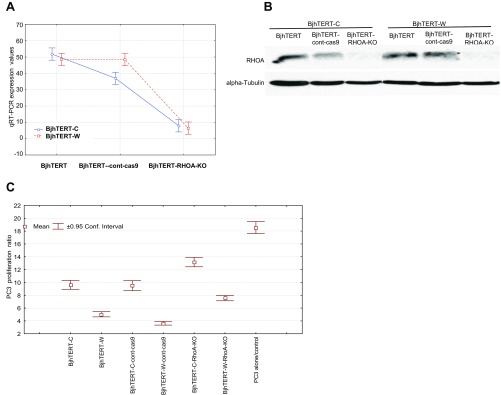Fig. S2.
CRISPR-Cas9–mediated RhoA gene knock-out in two additional isogenic clones of hTERT-immortalized human foreskin fibroblasts Bjh (BjhTERT-C and BjhTERT-W) caused loss of their tumor-inhibitory capacity in vitro. (A) qRT-PCR for RhoA expression in BjhTERT-C, BjhTERT-C–cont-cas9, BjhTERT-C RhoA-KO, BjhTERT-W, BjhTERT-W–cont-cas9, and BjhTERT-W RhoA-KO fibroblasts. y axis: expression levels of the RhoA gene normalized to level of TBP reference gene. x axis: the cDNA samples. Data are means with 0.95 confidence intervals of the respective means, from three separate experiments. (B) Representative Western blotting of the same six fibroblasts as in A, measuring RhoA protein levels in the total cell lysates. Actin protein levels are shown as the loading control. (C) Inhibitory capacity of confluent monolayers of the same six fibroblasts (4-d-old) tested in cocultures with the PC3 mRFP prostate cancer cells. y axis: proliferation ratio of PC3 mRFP cells after 6 d coculture with fibroblasts. Data are means with 0.95 confidence intervals of the respective means, from three separate experiments, with 50 separate wells in each.

